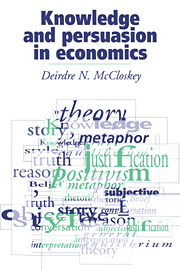Book contents
- Frontmatter
- Contents
- List of figures and tables
- Preface
- Acknowledgments
- Part I Exordium
- Part II Narration
- Part III Division
- Part IV Proof
- 9 The rise of a scientistic style
- 10 The rhetoric of mathematical formalism: existence theorems
- 11 General equilibrium and the rhetorical history of formalism
- 12 Blackboard Marxism
- 13 Formalists as poets and politicians
- Part V Refutation
- Part VI Peroration
- List of works cited
- Index
11 - General equilibrium and the rhetorical history of formalism
Published online by Cambridge University Press: 01 February 2010
- Frontmatter
- Contents
- List of figures and tables
- Preface
- Acknowledgments
- Part I Exordium
- Part II Narration
- Part III Division
- Part IV Proof
- 9 The rise of a scientistic style
- 10 The rhetoric of mathematical formalism: existence theorems
- 11 General equilibrium and the rhetorical history of formalism
- 12 Blackboard Marxism
- 13 Formalists as poets and politicians
- Part V Refutation
- Part VI Peroration
- List of works cited
- Index
Summary
It is not fair, however, to blame the department of mathematics for the economist's love of existence theorems. In fact, it is not fair to blame the mathematical economists themselves. Even non-mathematical economists have always loved existence theorems. Economists would have had to reinvent the calculus for their own lovely marginal analysis if it had not already been invented; likewise they would have had to reinvent fixed-point lemmas, the better to prove existence theorems. As Michio Morishima noted dryly, “students who have read works on social choice or Arrow and Hahn's monumental book General Competitive Analysis (1971) are likely to be surprised at the remarkable resemblance between such works and Spinoza's Ethica Ordine Geometrico Demonstrata” (Morishima 1984, p. 51).
It is not a matter of the use of modern mathematical notation. A mathematical spirit pervades the works of David Ricardo, who used no mathematics. Schumpeter called the spirit the Ricardian Vice, applying blackboard propositions untested to the world (Schumpeter 1954, p. 473). The Ricardian Vice has little or nothing to do with the use of mathematical formalism. The rhetoric of formalism, whether in words or statistics or mathematics, engenders the false hope that the blackboard will suffice. The physiocrats, a century before mathematics first came to economics, were attempting to solve great social questions by manipulating definitions.
- Type
- Chapter
- Information
- Knowledge and Persuasion in Economics , pp. 146 - 154Publisher: Cambridge University PressPrint publication year: 1994



